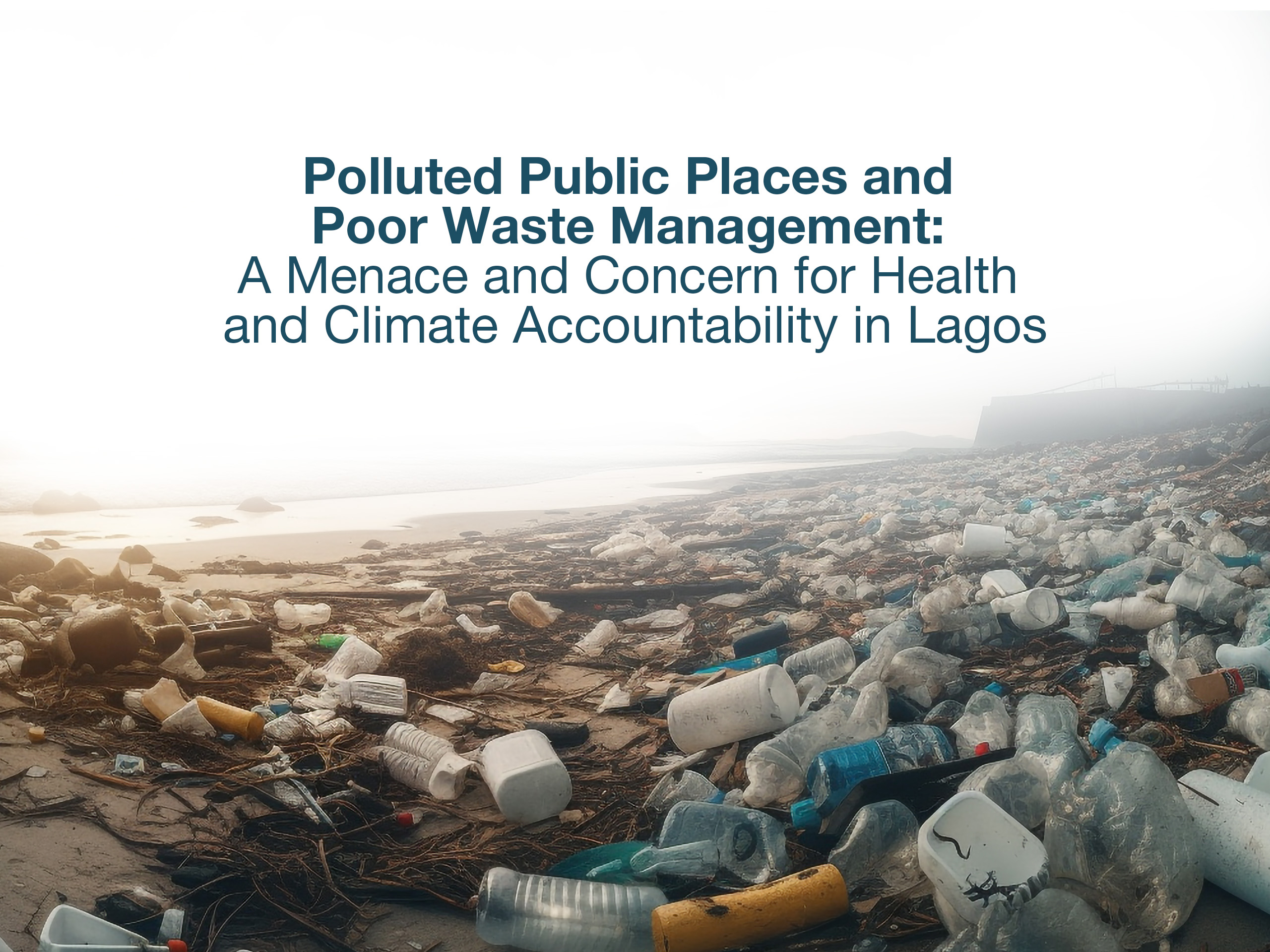A few months ago, on my way home from work, after a long day sitting in Lagos traffic, I was unfortunate to board a Keke NAPEP beside a suya seller on my final route home. As we waited for the tricycle to fill up with passengers, the suya seller fanned his roasting grill, which soon sent thick smoke our way. By the time we finally left the park, I had inhaled enough smoke to make me wake up the next day with a bad cough, and for more than two weeks, I’d end up trying to heal myself from the rattling cough. No one told me to get a nose mask and do the needful when commuting or in an unsafe public place.
That is just one instance in many experiences of an average Lagosian who commutes daily.
Every day, as Lagosians shuttle to and fro work and social activities, they contend with toxic emissions from expired trucks and vehicles that shouldn’t be permitted in a health-conscious society. Add the stench of waste disposed on street roads, major highways, and putrid landfill sites, and you will have a perfect picture of what breathing feels like in Lagos.
What can be more disastrous? Citizens carelessly burn wastes that could and should be recycled or properly disposed of, emitting more toxic chemicals into an already bumbled-up environment. On the other side, government waste management authorities turn a blind eye to their duties, doing the least, making public places a blight and nauseating menace.
You can feel the stench that this city has become from the moment you cross its boundary with Ogun State (at Berger), drive through Otedola Bridge, and move inward toward Ojota. Instantly, you are confronted with the stench hovering over the 7Up–Ikosi atmosphere, the cause of which is the dumpsite close to worship centers and SevenUp Bottling Company. If we should overlook that a church of such magnitude worships beside a disease-prone area, what about the soft drinks manufacturer—7Up, businesses, and residential homes nearby? Many other locations in the city have similar occurrences.
Lagos, Nigeria’s largest city, is recognized worldwide for its commercial superpower, bubbling ventures, unprecedented opportunities, and social life. But even more, Lagos boasts of having one of the highest populations of working-class people who have to commute every day in buses that have to be parked like sardines. As this earlier post suggested, transportation is one of the biggest problems this megacity battles with, but perhaps transportation is just one face of its many problems.
As climate change becomes a global burden and extreme spikes in weather conditions hit Lagos, increasing health concerns, there is the need to take proactive measures by all stakeholders.
IQAir, Lagos Air Quality Index, says PM2.5 concentration in Lagos is currently 2.5 times the WHO annual air quality guideline value, recording levels of 68 µg/m³, which poses long-term health risks (respiratory and cardiovascular concerns linked to air pollution) for exposed citizens. The index further advises that citizens and sensitive groups should:
- close their windows to avoid dirty outdoor air
- reduce outdoor exercise
- wear a mask outdoors
- should run their homes with air purifiers
How sustainable these measures are for citizens and sensitive groups is a question that begs for answers.
Source of Low-quality Air in Lagos
“The major source of air pollution comes from vehicle emissions, closely followed by industry and domestic energy use. Every day, 227 vehicles clog each kilometer of road. Most of these vehicles are over 15 years old and are not equipped with the latest emission technologies. The fuel they use has a very high sulfur content, which is 200 times higher than U.S. standards for diesel.” – IQAir
Against the backdrop of the rising climate crisis and COP28 Climate Summit, clean and well-maintained public areas should be prioritized as part of efforts to reduce emissions to safeguard public health, quality of life, and the well-being of citizens and communities that contribute to the economic growth and social life of the state.
Health Impacts of Exposure to Polluted Public Spaces and Poor Waste Management
The impacts of citizens’ exposure to pollutants in public places are far-reaching but preventable.
Respiratory Issues
Contaminated air containing chemicals, nitrogen dioxide, and sulfur dioxide can cause respiratory challenges for citizens, such as bronchitis (inflamed lungs), asthma, and chronic obstructive pulmonary disease (COPD). Prolonged exposure leads to reduced lung function and increased chances of suffering from respiratory infections.
Cardiovascular Issues
Air pollution from industrial sources and vehicle emissions has been associated with causing cardiovascular diseases, including heart attacks, strokes, and hypertension. Exposure to such an environment puts sensitive groups at increased risk.
Spread of Infectious Diseases
Polluted public spaces are high breeding grounds for bacteria, viruses, and pathogens. Exposure guarantees a chance of getting infected with diseases such as gastrointestinal, respiratory, and skin infections. Poor waste management, on the other hand, contributes to the spread of infectious agents (viruses, bacteria, fungi, protozoa, and helminths) in public areas.
Allergies and Skin Irritations
Air and environmental pollutants can trigger allergic reactions to allergens (pollen, mold spores, dust mites, and pet dander) in sensitive groups, resulting in symptoms such as sneezing, coughing, difficulty breathing, watery eyes, and skin rashes.
Reproductive, Mental, and Other Health Problems
Exposure to environmental pollutants during prenatal and early childhood stages of development can have lasting effects on neurodevelopment, cognitive function, and reproductive health. Heavy metals, pesticides, and endocrine-disrupting chemicals can interfere with hormonal balance and reproductive processes. At the same time, deteriorated environments can affect the mental health and well-being of citizens, leading to stress, anxiety, depression, and decreased quality of life.
Meanwhile, extended exposure to carcinogenic matters like air pollutants, industrial chemicals, and hazardous waste could increase the chances of developing various kinds of cancer (lung, bladder, and leukemia).
The health consequences of polluted public places are sweeping, especially for vulnerable groups like children, the elderly, and low-income communities.
Environmental Consequences
Lack of proper waste disposal mechanisms damages natural ecosystems, leading to littered and dirty public places, clogged sewage systems, contaminated water sources and bodies, loss of biodiversity, and a climate crisis. Such wastes, washed by erosion, flood into streams, rivers, and oceans, harming marine life and other natural habitats, disrupting species ecosystems, and threatening their survival.
Economic Costs
The cost of polluted public spaces affects the economic strength of any city or community as its citizens are prone to more health risks that limit human resources efficiency and general economic growth. Likewise, other economic activities like tourism, property value and real estate, outdoor life, and business activities take a stall as most citizens would rather protect their health than go outdoors. Conversely, environmental pollution affects the quality of ocean and marine life and resources, which renders them unfit for economic activities and use, such as fishing, irrigation, biodiversity conservation, and so much more.
Social and Cultural Effects
Just like the 7Up–Ikosi axis case, this buzzy tweet puts Dolphin Estate, a popular but insalubrious estate in the Ikoyi axis, in the spotlight. In the tweet, Nigerians described it with words like, ‘the breeding ground of stagnant waters that stink to the heavens,’ ‘expensive slum,’ ‘rich man barracks, the slum of Ikoyi,’ and a place where ‘mosquitoes are bigger than drones.’ When citizens see a community or neighborhood as an excessively polluted and unhealthy environment, they stigmatize it, leading to negative perceptions and social distance. Words go round, and such places get the scorn. However, when a place or neighborhood is safe for habitation, it becomes the world’s standard, such as the case of Sweden leading the world on proper waste management measures and Germany’s innovative waste recycling system. We have a lot to learn from those getting it right.
Sustainable Solutions and Action Steps for Healthier Public Places
Partnership with Recycling Startups
BudgIT believes in equal partnership in solving Nigeria’s problem, which is why the government must not only create a supportive environment for startups to thrive but also partner with them in their diverse areas of change to help address and overcome some of society’s biggest problems. Startups should be encouraged and given maximum support by leadership at the national and subnational levels. Invite them to the table on policies around climate action and creating a greener world.
Sanction Improper Waste Disposal in Marketplaces and Highways
Market associations and health sanitation agencies must take responsibility for maintaining health measures and cleanliness practices in their jurisdictions. Periodic, regular hygiene checks should be revived, while trade and market unions ensure members adhere to safe sanitary practices.
Innovative Waste Collection, Management, and Recycling Policy and System
The current waste and climate challenges we face as a country call for better policies and systems that make waste collection, management, and recycling easier for citizens and public workers. If other countries are doing it, we can start in our own little ways.
Civil Society Advocacy
Civil society groups in the climate field must go beyond attending public events for social media clots and bookmarks and get to work. They must champion grassroots climate action campaigns and education and influence government policies on energy transition, climate financing, and accountability.
Empower Citizens to Lead Waste Recycling Advocacy
Civil society climate advocates can help empower citizens to become involved in waste recycling practices, participate in local environmental advocacy efforts, or volunteer for causes that improve and protect their communities.
Empower Waste Management Authorities and Workers through World-class and Innovative Skills Training
Local waste management authorities need to be trained on innovative ways to address waste collection, management, and recycling that adhere to modern global standards. Pragmatic measures to enforce waste laws are also needed to make waste disposal experiences hygienic and accessible for all.
Government Investment in Green Infrastructure
Governments need to invest in green infrastructure assets and technologies to regenerate and turn former toxic public places into natural vegetative systems that enhance the natural environment, provide serene green spaces and safety, increase life expectancy and quality of life, encourage outdoor and communal activities and social life, cancel stigma, and spike economic growth.
Conclusion
While Lagos served as a case study for this article, these challenges are not peculiar to it. Proper waste management, safer public spaces, and the journey to achieving a cleaner, greener, and more sustainable world are for every state, city, and community in Nigeria, Africa, and the world at large. We must look inward as citizens, civil society leaders, volunteers, waste experts, and public leaders to question our contribution to the health and climate menace we face and how our individual and collective actions can help correct them and, if possible, save the earth.



